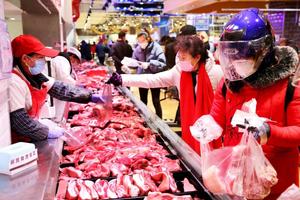 This undated photo shows people buying pork at a supermarket in Lianyungang, Jiangsu province. (WANG CHUN / FOR CHINA DAILY)
This undated photo shows people buying pork at a supermarket in Lianyungang, Jiangsu province. (WANG CHUN / FOR CHINA DAILY)
China's consumer price index, the main gauge of inflation, posted its first year-on-year drop in 11 years last month, mainly due to a high comparison base of pork prices, officials and experts said on Wednesday.
With prices of industrial goods rallying amid stronger market demand, the economy is still on a solid track for recovery despite the unexpectedly low CPI figure, they said.
CPI dipped 0.5 percent year-on-year in November, compared with 0.5 percent growth in October, marking the lowest level since October 2009, the National Bureau of Statistics said
"The decline in CPI does not mean there is a slowdown in economic growth. Rather, it is mainly due to high pork prices last year because of the African swine fever," said Channel Yeung, China market analyst at FXTM, a United Kingdom-based global trading platform.
"The world's second-largest economy is actually rebounding at the fastest pace since the COVID-19 outbreak," Yeung said, citing the recovering factory-gate prices.
CPI dipped 0.5 percent year-on-year in November, compared with 0.5 percent growth in October, marking the lowest level since October 2009, the National Bureau of Statistics said on Wednesday.
ALSO READ: China's consumer inflation falls to 11-year low in October
Dong Lijuan, an NBS statistician, said pork prices slumped by 12.5 percent in November from a high comparison base last year as pork production continued to recover. Pork prices represented a weighted 0.6 percentage point of the drop in CPI.
Meanwhile, the month-on-month growth in the producer price index, which gauges factory-gate prices, rose to a two-year high of 0.5 percent last month, compared with zero in October, meaning that prices of industrial goods have risen as market demand picked up, Dong said.
On a yearly basis, the PPI dropped by 1.5 percent in the same period, versus a 2.1 percent decline in October
On a yearly basis, the PPI dropped by 1.5 percent in the same period, versus a 2.1 percent decline in October.
Experts said the year-on-year CPI growth may turn positive starting in the second quarter of next year as the base effect fades while domestic demand speeds up its recovery, especially for consumer goods, offline services and corporate investment.
The pickup in consumption and the services sector will become the main driver of China's economic rebound as household incomes improve while the pandemic situation further stabilizes, underpinning an 8.8 percent GDP growth for 2021, KPMG said in a report on Tuesday.
READ MORE: KPMG: China's GDP growth expected to be 8.8% in 2021
Guo Liyan, a researcher at the Chinese Academy of Macroeconomic Research, said rising industrial goods prices have signaled improving profitability for industrial companies, which would be conducive to recovery in industrial investment.
As economic fundamentals remain robust, experts said the temporary CPI decline will have no major impact on monetary policy, nor on foreign businesses' confidence in the Chinese economy
"It is groundless to say that deflation is beginning to take hold," said Wen Bin, chief researcher at China Minsheng Bank.
The growth in core CPI, which excludes volatile food and energy prices to better reflect true demand, has stood at 0.5 percent on a yearly basis for the fifth consecutive month, indicating that the overall economy is healthy, Wen said.
As economic fundamentals remain robust, experts said the temporary CPI decline will have no major impact on monetary policy, nor on foreign businesses' confidence in the Chinese economy.
"The base-effect-driven CPI decline should be ignored in formulating monetary policy," said Iris Pang, chief China economist at Dutch bank ING.
READ MORE: China's consumer inflation eases, factory-gate prices fall further
Pang said she expected the People's Bank of China, the central bank, to focus more on financial risk prevention and make no changes in policy interest rates and the reserve requirement ratio in the coming months.
China's broad money supply, or M2, grew by 10.7 percent year-on-year during the first 11 months of the year, up from 10.5 percent a month earlier, the PBOC said on Wednesday.
Some recent surveys have indicated that many foreign businesses in China, including those from the United States and Japan, are upbeat about the country's economic development and market potential, Foreign Ministry spokesman Zhao Lijian said at a news conference on Wednesday.
About 44 percent of British companies that responded said in a survey that they are considering increasing investment on the Chinese mainland next year despite the challenges of the pandemic. The survey was released by the British Chamber of Commerce in China on Tuesday.
Chen Jia and Ouyang Shijia contributed to this story.


